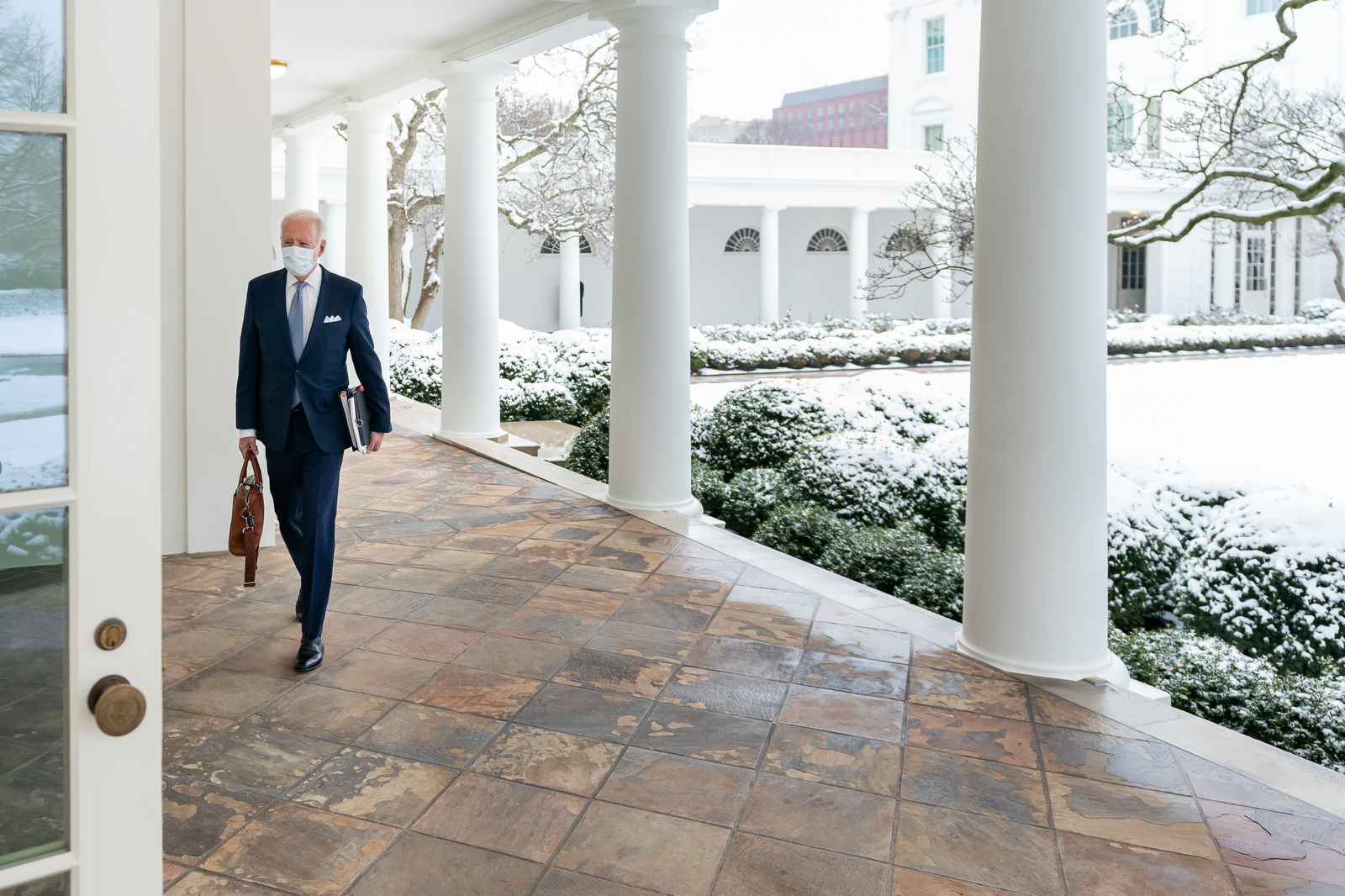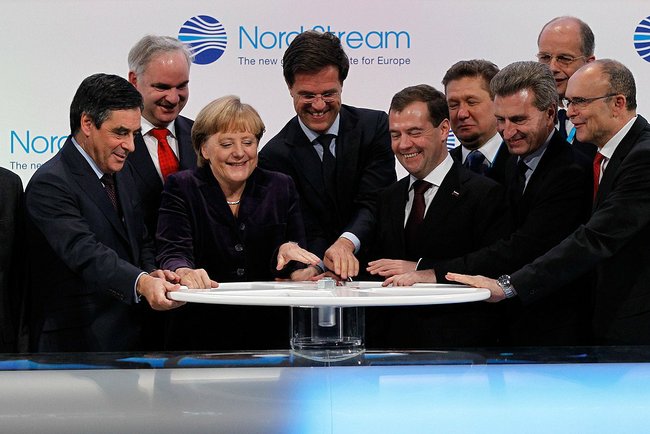
PATRICK LAWRENCE: Biden’s Missing Link with Europe
While the Continent welcomed the Cold War’s end, America — which would be utterly lost without an enemy — never has.
President Joe Biden at last got his chance to “sit at the head of the table” when he addressed (virtually, of course) the annual Munich Security Conference on Friday. Finally, he was able to repeat for America’s traditional European allies that endlessly rehearsed line of his, “America is back.”
It does not appear that those in attendance, notably the German and French leaders, tucked into their shared repast with anything remotely close to gusto. Chancellor Angela Merkel and President Emmanuel Macron seemed to wonder more or less out loud whether to take Biden’s “America is back” as a promise or a threat.
America’s political elites are so accustomed to swindling their citizenry with abandon that they make the fatal mistake of assuming they can bamboozle their counterparts abroad just as easily. Uh-uh. What it comes to, time and again, is lousy statecraft that leaves America and Americans that much further from the 21st century’s perfectly obvious realities — chief among them that the table is round now and nobody sits at its head.
“We must demonstrate that democracies can still deliver for our people,” Biden told the Munich session from the East Room of the White House. “That is our galvanizing mission. Democracy doesn’t happen by accident. We have to defend it. Strengthen it. Renew it. We have to prove that our model isn’t a relic of our history.”
There are two ways to read these remarks. One, Biden’s apparent intent was to curtain-raise the “global summit of democracies” his regime plans to convene — with Big Joe again at the head of the table — later this year. As a tin-eared attempt to recapitulate the West’s superiority over the rest, this venture is so fated to flop that it is a fair question whether Biden’s people will go through with it.
The West Grows Weary of the West
Apart from the U.S., even the West grows weary of “the West,” it seems. This is an excellent thing. My bet: The main-chancers managing Biden’s foreign and national-security policies will quietly ditch this project to spare their boss the embarrassment.
Two, one can but marvel at Biden’s nerve in going anywhere near the matter of delivering for “our people.” Promised relief checks are nowhere to be found, there will be no student debt forgiveness, no “public option” incorporated into our health care system, no $15-an-hour wage, millions of Americans cannot meet their bills, there are bread lines across the country, privatized public goods are failing: Does Biden think the rest of the world does not notice and can be as cavalierly flimflammed as those suckered into voting for him last November?

Here is Chancellor Merkel , speaking after Biden called on the Europeans to “prepare together for a long-term strategic competition with China,” to revive the NATO military alliance, and to sign on for a common response to all those alleged Russian interventions for which no shred of evidence has ever been presented:
“In recent years, China has gained global clout, and as trans–Atlantic partners and democracies, we must do something to counter this…. Russia continually entangles European Union members in hybrid conflicts. Consequently, it is important that we come up with a trans–Atlantic agenda toward Russia that makes cooperative offers on the one hand, but on the other very clearly names the differences.”
And here is Macron, who famously termed NATO “brain dead” in an interview with The Economisttwo years ago and who evinces a pronounced Gaullist streak on the question of Europe’s “strategic autonomy,” as he puts it:
“I do believe in NATO…. I do believe NATO needs a new political momentum and clarification of its strategic concept. NATO needs a more political approach…. I do believe the best possible involvement of Europe within NATO is to be much more in charge of its own security.”
This is how Europeans have come to humor American blowhards such as Biden. Yes, we must “do something” about China and we must “name the differences” with Russia — both thoughts falling well short of the new Cold War Biden urged. Yes, NATO is OK, but it ought to think politically as against militarily, and as a Cold War institution it is indeed outmoded.
European Parrying Act
We can also call this parrying, an activity Europeans have got very good at since it became clear, at least as far back as the Obama administration, that Americans simply do not understand the dynamics of our new century.
Here is Merkel again, at a moment she slipped the gloves partly off:
“Our interests will not always converge.”
Macron, in a similarly forthright mode, reiterated his compelling argument that European security required not animus and more NATO advances eastward but “a dialogue with Russia.”
The Munich Security Conference was Biden’s first turn as a statesman on the global stage. It is important we do not miss its significance.
In the immediate, what lies out front in trans–Atlantic relations is lip service in response to America’s incessant efforts to keep the world as thoroughly divided and on edge as possible. Europe, meanwhile — which understands and favors multipolarity as a 21st century imperative — goes its own way as measured by “facts on the ground.”
The European Union and China, let us not forget, signed the most extensive investment accord in China’s modern history at the turn of the year — this over the 11-hour objections of Jake Sullivan, since confirmed as Biden’s national security adviser. Germany will go along with the ridiculous charade involving Alexei Navalny’s now-disproven “poisoning,” but it will complete Gazprom’s Nord Stream 2 gas pipeline despite Washington’s frantic efforts to block it.

Let us now watch as Germany chooses Merkel’s successor later this year. Armin Laschet, the just-named head of the Christian Democratic Union and the front-runner for the chancellorship, is uninterested in Washington’s Cold War-ish machinations in favor of cooperative relations with Moscow and Beijing alike.
In these immediate considerations we can detect a longue durée, a deeper current of history, that has been evident in trans–Atlantic ties since the Cold War’s end. No U.S. administration has understood this force in the slightest, and Biden’s may prove the stupidest given how swiftly this dynamic now drives European thinking. Certainly. it was evident in what Merkel, Macron and other Europeans had to say in Munich.
Europe welcomed the Cold War’s end as America, which would be utterly lost without an enemy, never has. During the three decades since, the Continent has faced two questions it will ineluctably have to resolve in years and decades to come. Geography is destiny in both cases, fair to say.

One question concerns the industrial democracies’ position at the western end of the Eurasian landmass. After many years of dithering and fumbling, which Europeans are also good at, they are now addressing this reality more directly and — not to be missed — in their own interest. This is what we heard at the Munich conference.
Look at a map: What we call the Continent shares a border with Russia, whose identity is European and non–Western all at once. Beyond Russia lies China, whose Belt and Road Initiative, despite problems of poor planning and overreach, is about nothing if not the natural unity of the landmass that stretches from Shanghai to Lisbon.
It would be folly to suggest that any sort of decisive breach in trans–Atlantic relations is in the offing. European leaders are very clear on this point. Is the Continent likely to emerge as a separate pole of power bridging West and non–West? This is a separate question, and my answer is a cautious yes — providing European leaders cultivate and maintain a thorough grasp of history and their place in it.
The second question concerns Europe’s periphery. One way or another, the Continent will have to develop a sustainable settlement with the Islamic nations of North Africa and the Middle East. The U.S. can bomb and disrupt these nations with impunity because they are distant. Europe enjoys no such luxury, if “luxury” is our term.
I see few signs Europeans are at all aware of this second imperative, but there are a few. When the “E3” — France, Germany and Britain — broke with the U.S. after the Trump administration withdrew from the nuclear accord with Iran, it was an announcement that, just as Merkel said in Munich last week, European and American interests can no longer be assumed to be congruent.
I recall no previous time when an intellectual grasp of underlying global realities, along with a literate awareness of history’s turning wheel, mattered more than now. It is early days, but the Biden administration appears to be woefully deficient on both counts.
Memo to Biden: Mr. Prez, forget the long refectory table with a headmaster’s chair just for you at one end. The dining room has been refashioned.


Dear Patrick,
After endless US journalists and academics writing endlessly about the China fear and threat and pointing to how America is back and ready to lead the world again – it is such a pleasure to read your pieces!
I am also a former EU correspondent for FEER and currently run by own think tank and global advisory company. I have often yearned to hear responsible US commentators and am delighted to have found you. I write about similar themes and say similar things…albeit in a less outspoken manner. We Europeans are courteous as you know!
Anyway, please do get in touch if you think it worthwhile and go to my website to reach my articles and see the other stuff I get up to.
Best,
Shada Islam